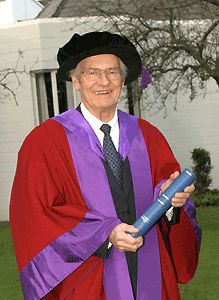Dr Clark Brundin Hon LLD
 It is a great pleasure to introduce Dr Clark Brundin to you. Dr Brundin was the Vice-Chancellor of the University of Warwick from 1985 to 1992 and could be said to have established the tradition of American Vice-Chancellors of the University of Warwick.
It is a great pleasure to introduce Dr Clark Brundin to you. Dr Brundin was the Vice-Chancellor of the University of Warwick from 1985 to 1992 and could be said to have established the tradition of American Vice-Chancellors of the University of Warwick. Clark was born in Los Angeles and educated at the California Institute of Technology and the University of California at Berkeley, institutions of the highest calibre. After receiving his PhD and a brief period in the US Navy, he started his research career in engineering and particularly in gas dynamics, at the Department of Mechanical Engineering and the Institute of Engineering Research at Berkeley in California. In 1963 he took the bold step of moving to the University of Oxford and a Fellowship at Jesus College, where he became very interested in engineering education and took responsibility for a new honours degree in Engineering, Economics and Management. His period at Oxford culminated in appointment as Vice-Chair of the General Board of the Faculties probably Oxford's most senior academic administrator under the Vice-Chancellor where he developed a reputation for interpersonal skills and diplomacy that attracted him to the appointing panel for Warwick's Vice-Chancellor in 1985.
Clark's seven year reign at Warwick was a period of unprecedented success and remarkable expansion. Student numbers doubled and building on campus continued apace. Buildings for Psychology and Biotechnology were constructed, the Advanced Technology Centre was built and opened by Prime Minister Margaret Thatcher, Social Studies was extended to house Warwick Business School, significant additions were made to this building, the University Arts Centre, and we opened a series of post-experience centres, pioneering buildings for the University community in the UK, constructed to the level of 4-star hotels. A new standard was also set in student accommodation with Jack Martin and Arthur Vick Residences being built with single rooms and ensuite facilities. The famous, or infamous, Research Assessment Exercise, was first launched in 1986 with a subsequent review in 1989 from which Warwick emerged as fifth in the UK followed by sixth in 1992, an initial success that we have managed to maintain over subsequent exercises right through to the present time. Clark encouraged Warwick to cooperate with industry and in this period the Warwick Manufacturing Group, Warwick Business School and many other areas of University activity, developed significant links.
In 1990 the University received the prestigious Bertelsmann prize for combining 'in an exemplary fashion, academic excellence and the imaginative generation of revenue'. Clark went to Germany to be presented with this prize by the Chairman of the Bertelsmann Corporation and Foundation, Dr Reinhardt Mohn. The University then used the Bertelsmann money to fund scholarships for students from the newly democratic East European countries. In October 1991 for example, 15 East European scholars - post graduates from Hungary, Czechoslovakia, Poland and Romania - came to Warwick.
The list of successes during the late 80s goes on and on. The Mead Gallery, the University's art gallery, was opened. We purchased the monumental Richard Deakin sculpture entitled Let's Not Be Stupid, perhaps the most significant commission of a work of sculpture by a British university in the twentieth century. Our widening participation lifelong learning activities flourished with the launch of part-time degree programmes and 2+2 degrees. The campus was developed with the creation of two more lakes, significant planting of trees and became a haven for wildlife. Clark was instrumental in launching the Warwick Graduates' Association and became its first Honorary President, saying that he hoped it would be the start of a long and fruitful relationship between the University and its graduates. This has certainly proved to be the case, we now have 105,000 graduates and our alumni help to support 300 students through Warwick Graduates' Association Scholarships.
The University is now in the middle of preparations for the celebration this year of its fortieth anniversary. Many of us with long memories remember the twenty-fifth anniversary celebrations which Clark presided over and which were carried out with style and with panache. We hope that we can emulate those celebrations this time.
One incident I am sure Clark will not forget is the time that he organised a raid on the campus store for food. He was not arrested and prosecuted but was in fact congratulated because it was the time of the big freeze in 1990, end of term 1990, and students, parents arriving to collect students and conference guests arriving to fill the vacant rooms, were all stranded on campus in three feet snow drifts. The raid on the campus store was necessary to feed all the unexpected guests. The University Treasurer helped in this by using a pair of wire cutters to break into the supermarket. Everyone was fed and next morning Clark and his wife were seen directing operations to clear snow from Gibbett Hill Road to allow people to escape.
There is no doubt that the period of the late 80s and early 90s laid the ground work for the success of the University in the subsequent decade and we have Clark, amongst others, to thank for this.
This citation was written by Professor Stuart Palmer, Deputy Vice-Chancellor
